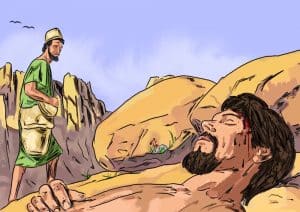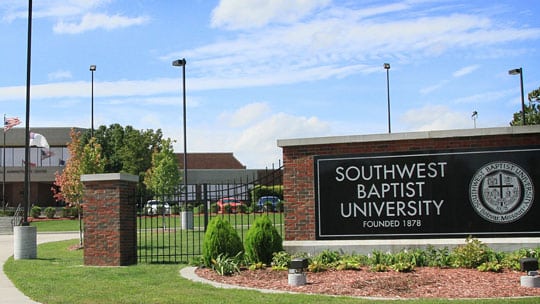We are a nation led by people crossing by on the other side of the road.
As Jesus explained what it means to “love your neighbor as yourself,” he told a parable in Luke 10 about a man beaten and left for dead on the side of the road between Jerusalem and Jericho. First a priest and then a Levite showed up, but once they saw the man they crossed by on the other side. That is, they decided to leave the man to die. But perhaps they offered their ‘thoughts and prayers’ as they crossed by.

Brian Kaylor
Had a third man — a Samaritan — not shown up and rescued the beaten man, the priest and Levite would have shared some of the responsibility for the man’s death. Even the lawyer seeking to justify himself saw which man showed what it means to love one’s neighbor. Can we see it today?
Once again, our news tells us of mass shootings. On Aug. 3, a man armed with a semi-automatic assault gun killed 22 people and injured 24 others at a Walmart in El Paso, Texas. Just hours later, another man killed nine people and injured 27 others outside a Dayton, Ohio, restaurant in less than a minute with a semi-automatic assault gun.
Over the last few years, we’ve seen many similar deadly attacks with assault weapons — at locations including a concert, nightclub, high school, elementary school, synagogue, and church. Basically, there is no place where one is truly safe from guns in America.
We are, after all, the nation with the most guns per capita — even more than countries embroiled in war. And, thus, we also have more mass shootings than any other country. States with more guns and fewer gun restrictions generally see more such shootings.
We don’t have more mentally-ill people than other countries or more video gamers than other countries or even more evil people than other countries. We have more guns — and we have more people dying from guns.
We are literally killing ourselves. Yet, our nation’s political leaders cross by on the other side of the road. Perhaps they cross by because they don’t want to upset voters who are also crossing by. Perhaps they cross by because that other side is where the lobbyists handing out campaign money are standing. Perhaps they cross by because, like the priest and Levite in Jesus’s story, they just don’t care enough for the lives of their fellow humans.

Shutterstock
What we need are more people in power who will stop and help, even if it costs them. We need more people willing to take up the prophetic vision of Amos and Isaiah and today beat our guns into garden tools. We need more people to understand the parable of Jesus like Baptist preacher Martin Luther King Jr. explained it in his last sermon before he was shot to death.
“It’s possible that these men were afraid,” King said of the priest and Levite. “You see, the Jericho road is a dangerous road. I remember when Mrs. King and I were first in Jerusalem. We rented a car and drove from Jerusalem down to Jericho. And as soon as we got on that road, I said to my wife, ‘I can see why Jesus used this as a setting for his parable.’ It’s a winding, meandering road. It’s really conducive for ambushing. … And you know, it’s possible that the priest and the Levite looked over that man on the ground and wondered if the robbers were still around. Or it’s possible that they felt that the man on the ground was merely faking. And he was acting like he had been robbed and hurt, in order to seize them over there, lure them there for quick and easy seizure. And, so, the first question that the Levite asked was, ‘If I stop to help this man, what will happen to me?’ But then the Good Samaritan came by. And he reversed the question: ‘If I do not stop to help this man, what will happen to him?’”
“That’s the question before you tonight,” King added. “Not, ‘If I stop to help the sanitation workers, what will happen to all of the hours that I usually spend in my office every day and every week as a pastor?’ The question is not, ‘If I stop to help this man in need, what will happen to me?’ ‘If I do not stop to help the sanitation workers, what will happen to them?’ That’s the question.”
And that’s the question facing us today. Do we love our neighbors as ourselves? Do we care more about Jesus’s second greatest commandment than we do the Second Amendment? Do we care about the lives of others? If we do not stop to help, what will happen?
Brian Kaylor is editor & president of Word&Way.


